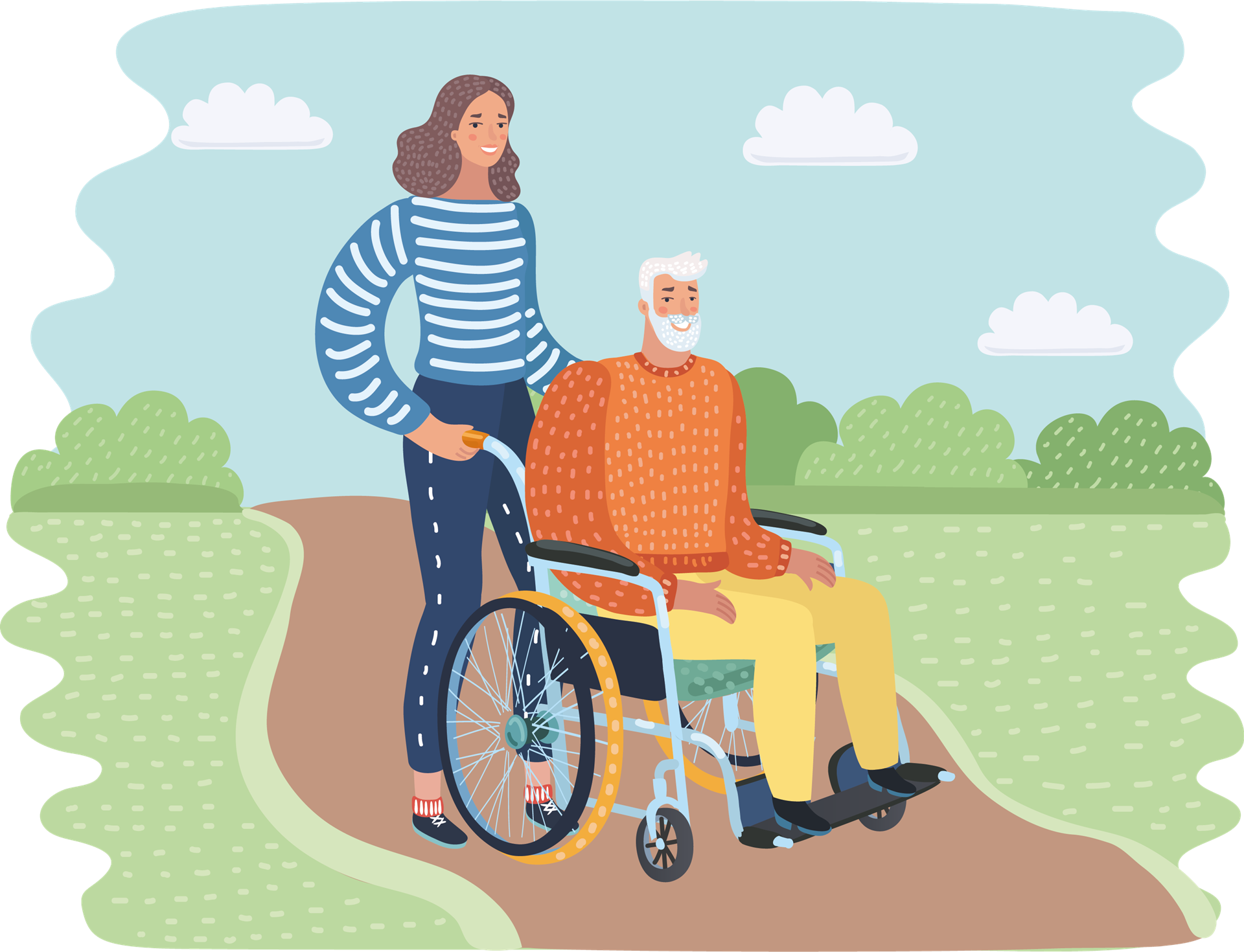Funding & Planning

- Mid Hampshire
- Information & Support
- Funding & Planning
Support with the cost of taking care of elderly parents at home
When it comes to paying for homecare in the UK, there are multiple funding options available. Depending on your circumstances, you may be eligible for:
- Attendance Allowance
- Carer’s Allowance
- Social Services Funding
- Personal Health Budgets
- NHS Continuing Care Funding
We have summarised each funding option below to help you clarify the right funding for your situation.

Carer’s Allowance
Suitable for: people caring for their family members full-time
You could get £83.30 a week if you care for someone at least 35 hours a week and they receive certain qualifying benefits. You do not have to be related to or live with the person you care for, and you will not get paid extra if you care for more than one person. If someone else also cares for the same individual, only one of you can claim Carer’s Allowance.
To claim Carer’s Allowance, you must:
- Be aged 16 or over.
- Spend at least 35 hours a week caring for someone who gets certain benefits (such as Attendance Allowance, the middle or highest rate of Disability Living Allowance, the daily living component of Personal Independence Payment, etc.).
- Earn £196 a week or less (after certain deductions) if you work. (This figure can change, so always check the latest earnings threshold.)
- Not be in full-time education or studying for 21 hours a week or more.
Carer’s Allowance is a taxable benefit and can affect other benefits that you and the person you care for receive. You only pay tax on it if your total income is above your Personal Allowance.
Even if you claim Carer’s Allowance as a family carer, you may still need to fund respite care to take a break from your caring role from time to time. Local authorities may offer some support toward respite care, so inquire with your council about what help is available.
How You’re Paid
You can choose to be paid:
- Weekly in advance, or
- Every 4 weeks
Your payments will go directly into your chosen account, such as a bank account.
Additional Support
For each week that you receive Carer’s Allowance, you will automatically get National Insurance credits. You may also be eligible to apply for:
- Support from your local council (including respite services).
- Council Tax Reduction.
- Universal Credit, if you’re on a low income or out of work.
- Pension Credit, if you’re over State Pension age and need additional income support.
- Grants and bursaries to help pay for education or training courses.
For more information, please visit the Carers Allowance page on gov.uk.
Note: Figures accurate as of April 2025
Attendance Allowance for care in the UK
Suitable for: people over 65 with physical or mental disabilities.
Attendance Allowance is a tax-free Government benefit available to those of State Pension age or older who need support with personal care due to a disability or health condition. This benefit helps cover additional costs related to your care needs, and it is not means-tested.
Attendance Allowance is paid at two different rates depending on the level of support required. You could receive either £73.90 or £110.40 per week if both of the following apply:
- You have a physical or mental disability, or a health condition that requires personal care support.
- You are of State Pension age or older.
The basic rate of £73.90 per week is for those who need frequent help or constant supervision during the day, or supervision at night. The higher rate of £110.40 per week is available if you require help and supervision both day and night or if you are living with a terminal illness. This benefit does not cover mobility needs.
It is possible to receive extra Pension Credit, Housing Benefit, or Council Tax Reduction if you qualify for Attendance Allowance. Importantly, you do not need to have someone actively caring for you to be eligible for this benefit.
For those nearing the end of life due to a life-limiting illness, there is an alternative, expedited application process.
Further information on Attendance Allowance is available on the Government website: www.gov.uk/attendance-allowance.
Note: Figures accurate as of April 2025

Social Services Funding for homecare
Suitable for: people who have limited savings to pay for homecare
Social Services Funding is a means-tested fund available if the person needing care has less than £23,250 in savings. If this is the case, ask your local Adult Social Services department to arrange a Community Care Assessment.
If the person is eligible for council-supported care services, the local authority will allocate a social services care package. The maximum hourly rate for homecare services varies from one authority to another. It is unlikely to cover the full hourly cost of a quality homecare service, such as Right at Home.
As a result of a Government initiative to give you greater choice, you can now take control of your budget. Social Services will pay a set amount towards homecare for anyone who is eligible. Once you have received this support payment, there is then an option to top up the sum with your own funds. This allows you and your loved ones to arrange a homecare service that suits your needs, rather than being confined by a specific government-set budget.
This route is called Direct Payments. Find out more about personal budgets and direct payments or read the social care and support guide from the NHS.
Discover More: Interested in learning more about the cost of quality care? Check out our guide on calculating homecare costs for more information.
Personal health budgets
Suitable for: anyone who needs homecare support
Personal health budgets are funded by the NHS. They are an optional way of achieving your health and wellbeing goals, giving you greater control over decision-making.
A personal health budget can either be self-managed or managed by the NHS team or a third party. If self-managing, you will receive Direct Payments to spend on healthcare services you have chosen and arranged yourself.
Alternatively, the NHS team or a third party will support you to identify the services you need. They will also arrange and pay for the services on your behalf. Personal health budgets are fully funded by the NHS and cannot be ‘topped up’.
Find out more about personal health budgets on the NHS website.
Choosing How to Receive Your Personal Budget
Once your personal budget has been determined, you have several options for how you receive and manage it:
- Council-Managed Budget: The council retains control of the funds and arranges your care on your behalf. This option might suit you if you prefer not to manage the logistics of your care directly.
- Third-Party Management: You can have the funds paid to an organisation, such as a care provider, which will then manage your care according to your care plan. Be aware that some organisations may charge for this service.
- Direct Payments: If you wish to take full control, the funds can be paid directly to you or someone you trust. This option, known as direct payments, offers the most flexibility and autonomy in managing your care.
You can also opt for a mixed package, where the council manages part of your budget while the rest is given to you as a direct payment.
The Benefits of Direct Payments
Direct payments are an excellent option for those who value independence and want to tailor their care to their specific needs. Here’s how direct payments can benefit you:
- Personalised Care: You can hire care workers or personal assistants who align with your preferences, such as language, culture, or experience in handling specific needs.
- Consistency and Reliability: By hiring your own staff, you ensure that the same people are consistently involved in your care, providing familiarity and stability.
- Flexible Scheduling: Direct payments allow you to arrange care at times that suit your lifestyle, whether it’s help with morning routines or assistance with evening activities.
- Social Inclusion: You can use your budget to pay for support that enables you to participate in social activities, fostering connections and reducing loneliness and isolation.
Managing Direct Payments
Opting for direct payments means you take on the responsibility of managing the funds and ensuring they are spent according to your care plan. Here are some key aspects to consider:
- Record Keeping: You’ll need to keep records of how you spend the money. Most councils require evidence of spending every three months, so it’s important to stay organised.
- Employment Responsibilities: If you choose to hire your own carer or personal assistant, you will be their employer. This includes responsibilities such as conducting background checks, handling tax and National Insurance, and managing pension contributions.
- Support for Management: If managing the payments feels overwhelming, you can ask a trusted friend or family member to help. They can manage the payments on your behalf through a trust arrangement, ensuring the funds are used correctly.
When Direct Payments Might Not Be Suitable
While direct payments offer significant benefits, they may not be the best choice for everyone. You might consider other options if:
- You’re Uncomfortable Managing Finances: If you’re worried about handling the money or keeping records, the council can manage the budget for you, reducing the burden.
- Frequent Hospital Stays: If you spend a lot of time in the hospital, direct payments might not be practical as your care needs could fluctuate frequently.
- You Prefer Professional Management: If you would rather focus on your well-being and leave the care arrangements to professionals, letting the council or an agency manage your budget might be the better option.
Applying for Direct Payments
If direct payments sound like the right choice for you, the process to apply is straightforward. After your needs assessment, you should be offered direct payments as an option. If not, you can request them through your local council’s social services department.
The council will then arrange for the funds to be transferred to you, either via a direct bank transfer or a pre-paid card. It’s important to sign a direct payment agreement, which outlines how the money should be spent and your responsibilities if you choose to hire someone.
What If You Need Help Managing Your Direct Payments?
Managing direct payments can feel daunting, but there are resources available to support you. Your local council can provide advice, and organisations like Money Helper and Disability Rights UK offer guidance on managing your budget.
If you’re struggling, you might consider allowing someone else to manage the payments. This could be a carer, a family member, or an advocate who understands your needs. This person can help ensure that the funds are spent correctly and in line with your care plan.
Seeking Help and Making Complaints
If you need support managing your personal budget or direct payments, your local council is the first point of contact. Additionally, several organisations offer helplines, such as Disability Rights UK and Age UK, which can provide further assistance.
If you’re unhappy with how your personal budget is handled, or if you disagree with the council’s decisions, you have the right to make a complaint. Start by discussing your concerns with your social worker or the council’s social services department. If necessary, escalate the issue to the Local Government Ombudsman.
NHS Continuing Care Funding
Suitable for: outpatients who require ongoing care beyond hospital
If you have needs that result from disability, accident or illness, you might qualify for free NHS Continuing Care. This is also applicable to those with complex medical problems.
NHS Continuing Care Funding is only available for people who need nursing care rather than social care. It can cover healthcare costs, personal care, accommodation or support for carers if you are being looked after at home.
To find out if you are eligible for free NHS Continuing Care, you must first undergo initial screening. This screening is followed by a thorough assessment by a team of two or more familiar health and/or social care professionals. If your health is deteriorating rapidly, you can ask about a fast-track assessment to bypass the initial screening.
If you don’t qualify for NHS support at the first assessment and your circumstances change, you can request a review. You may still qualify for Local Authority funding for some of your care needs.
Find out more about continuing healthcare on the NHS website.
And consider whether our homecare after hospital service might be right for you.
FAQs about funding for homecare services
How do savings affect care funding charges?
A person with savings over £23,250 will not receive any financial help. For a person with savings between £14,250 and £23,250, £1 income for every £250 between these amounts is assumed.
Mortgage, rent, savings and expenses due to disability are all taken into consideration and the amount left is their ‘available income’. The person can then be asked to contribute 65% of this towards the cost of their care.

